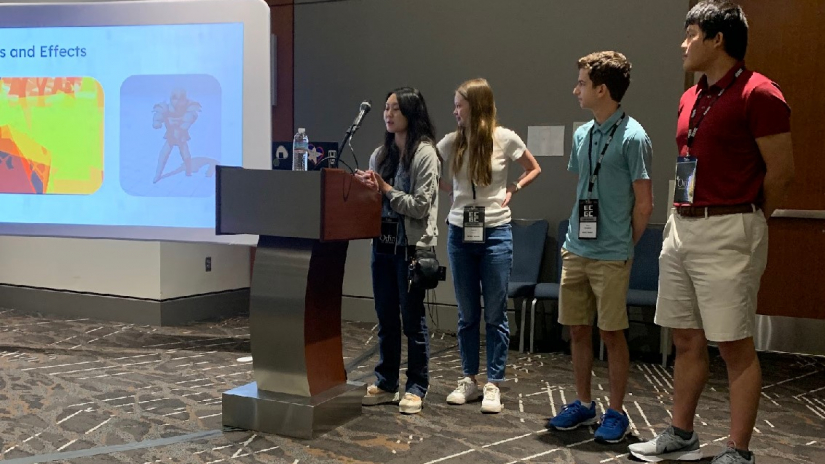
Virtual reality, fictional worlds, and games are all over the so-called real world: from education, business, and popular entertainment to how we conduct politics, meet other people, and define ourselves and our communities. Although new technologies make videogames and extended reality prominent in the contemporary moment, fictional scenarios, virtual worlds and gamified systems have played important roles in culture and society for centuries.
This cluster considers how the virtual, the fictitious, and the gamified shape the circulation of information and the making of meaning. It likewise looks at their antecedents and analogues in older immersive forms like role play, the print novel, film, and television. When we examine the continuities among the virtual, the fictional, and games, we find all sorts of contradictions underlying how they work in the real world. All have been deployed to serve the ends of the powerful and the oppressed; to train particular professions (from doctors to soldiers); and to reveal social inequities across race, gender, sexuality, and (dis)ability. Believe it or not, reading novels was once described in the terms we now use for video game playing: the salvation of an industry, but addictive and the scourge of youth. From collaborative storytelling to war games, this cluster considers the range of social and antisocial uses of immersive worlds. Whether we read about, watch, or play the part of killers, achievers, party guests, explorers, or some other yet-to-be-determined role, we will discover how versions of ourselves come into being through versions of virtuality, fictionality, and gaming.

Shai Ginsburg, Chair of and Associate Professor in the Department of Asian and Middle Eastern Studies
This class is different: It is about both playing hard and working hard; it is about questioning the opposition between playing and working. We inspire to work through play and play through work, and have fun doing both! We take games both as great fun and very seriously. True, we are about to play games—many games—and, hopefully, have fun doing so; but we will also consider the games we play (as well as other games) in a scholarly fashion, as important products of our culture, as something that can tell us about our society, politics, and ideology. We will thus look at tabletop games and videogames from divergent perspectives: historical, sociological, political, military, literary and more, paying particular attention to game design and the ways it shapes our experience not only of the game, but also of the world. Our driving contention is that the understanding of game design and gameplay can enhance our understanding of cultural and political dynamics.

Victoria Szabo, Research Professor of Art, Art History, & Visual Studies; Director of the Certificate Program in Information Science & Studies, Director of Graduate Studies of the PhD Program in Computational Media, Arts & Cultures
Digital storytelling and interactive narrative take advantage of new technologies to tell stories that are multimodal, participatory, and open-ended. Those that take advantage of game engines also build upon imagined worlds that are designed with procedural elements in mind. In this course we will explore the distinct affordances of digital media for storytelling, considering both how they can realize possibilities latent and expressed in earlier forms of storytelling, and can offer up possibilities that are entirely new in programmed, interactive, and extended reality environments. For inspiration and context we will read/view/experience and
critique examples of open-ended and interactive narrative forms going back to diverse oral traditions and exhibition practices, as well as to relevant novels, film, apps, and games. Our critical readings will draw from theories of play, game design, and virtuality and will include consideration of open world, non-linear, and location-based storytelling techniques. Throughout the course we will consider questions of authorship, agency, authority, and collaboration as well as how the user/player/interactor becomes an active participant and even a co-creator in the stories we tell. As we apply the lessons of these readings to historical and contemporary examples, we will consider what makes a digital story “good,” and how concepts derived from game studies apply to these interactive media forms more broadly, as well as what we can learn about creating better games from our research. We will also do hands-on exploration of the topic by using digital media authoring tools to share original and adapted digital stories of our own.

Sarah Milne Pourciau, Associate Professor of German Studies
What is “virtual reality”? If something is real, isn't it also always actual, and if virtual, only almost or nearly real? What strange, hybrid no-mans-land lies midway between truth and illusion, and how can we learn to navigate inside this space? The puzzle is an old one, even if the technology we call VR is new. In this discussion-intensive course, we will read, watch, and play our way through some of the most powerful attempts to understand humanity's penchant for collective dreaming: from Plato's allegory of the cave, to the immersive spectacles of baroque theater, to the ghostly realms of gothic literature and modern film, to the invention of cyberspace and parallel universe games.

Hilary Huskey, Instructor in Information Science and Studies
This course surveys history, art, technology, narrative, ethics, and design of interactive computer games. Games as systems of rules, games of emergence and progression, state machines. Flow, systems of pleasure, goals, rewards, reinforcement schedules, fictional and narrative elements of game worlds. Responses to immersive & interactive media; experience of gamified systems in diverse contexts. Social, artistic, and cultural effects of games: impact, harm, benefits. Team design and development of game-design storyboards and stand-alone games. Interplay between narrative, graphics, rule systems, and artificial intelligence in the creation of interactive games. Programming experience not required.